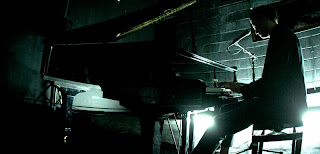Project Arts Centre, Dublin
Feb 22-26
My review of the wonderful Mimic coming up just as soon as I paint a masterpiece sorta thing …
“You have to pretend to be something before you can become anything”
- Mammy Neary
“The piano is the social instrument par excellence ...”
- Jacques Barzun
Mimic is a sweet phenomenon.
Having first appeared in 2007, Raymond Scannell and his grand piano toured to various festivals and eventually the Dublin Fringe in 2008 where Scannell bagged the ‘Best Male Performer’ award. I was oblivious to its existence until three weeks ago (2007 and 2008 were big video games years for me) with the Project Arts Centre’s impromptu announcement of the show’s run in its current season. From everything down to its programming, its delightfully deviatory presentation, and its strangely relevant relationship to cultural scenery considering its age – Mimic is a sweet phenomenon.
Scannell plays the role of the Mimic, relaying his story with accompanying piano arrangements. The story is of Julian Neary – a meandering young man who in absence of a personal heritage finds an immaculate gift for impersonation. The Neary family, into which Julian is adopted, harbour traditional values in regards to Irish society and custom. He and his sister Aoife camp in the basement where Julian’s impersonations of Columbo, Morrissey and others crack them up. His affections for his sister become something more. Aoife departs for Manchester with a boy, leaving Julian to dwell on his dark twisted psyche. However, the misfit’s aptitude for mimicry soon earns him points with others and Julian becomes accepted into social life. This stability collapses and Julian decides to set off for Manchester to reunite with his sister, only to find her among a crowd of dismayed Irish ravers who have grown angry with Celtic Tiger Ireland’s departure from traditional values. It’s not a war close to Julian’s heart, but considering the group leader’s close relationship with his sister he decides to stick around. Cultural tensions heighten, and as Irish society’s obsession with enhancement leads the country into an identity crisis of its own, the “tapestry of voices” inside the Mimic’s head struggles for dominance with the singular voice of his sister’s lover and revolutionary leader. A voice to adhere to? A voice to mimic?
Scannell is a force in this piece, captivating our imaginations with great acting ability, flawlessly calling upon the voices in his character’s vocabulary. His writing bears resemblance to Enda Walsh’s at times, punctuating dark performative satire with profound impressions that are insightfully human. While Walsh’s work is to be fed into physical performances, Scannell’s writing operates on a more lyrical and at times subtle level. Like a spoken word piece our imaginations follow his disposition, allowing us to make our own connections. It is a space where drops of musical notes and ideas not only stir our imaginations but encourage them to colour in the conclusions. Music and phrasings are teamed together in tempo as a dashing thread of notes have us running along with the Mimic in his sprint for survival, while a troublesome trickle of flats and sharps announce his mother’s arrival into his den. A whiff of high notes flick back Aoife’s hair while a burdened melody tugs our chests during Julian’s reunion with his parents.
I really can’t commend Ray Scannell enough. Aside from a fierce performance in Druid’s The Walworth Farce back in 2009, I do wonder why we don’t see more of the man. Scannell is easily in the same league of young male actors such as Tadhg Murphy and Aaron Monaghan. Mimic does add to the portfolio of director Tom Creed, who continues to find wonderful new artifices for artful forms of expression. Here’s hoping that the two collaborate together again.
Scannell wrote Mimic prior to the announcement of the recession, and his portrayal of a society obsessed with improvement seems almost prophetic. When Julian returns home he finds his Papa Neary at his desk, heartbroken with his loss of connection with a nation of honourable ideals, all now engrossed by the disillusions of Celtic Tiger excess. The Ireland of Mimic becomes one obsessed with self-betterment, and the same can be said of our own. The general election over this weekend has proven to be one of the most radical rearrangements of our governmental structure in history. Voters were determined for a change of political monopoly. It was ominous to go to Mimic on Saturday night and, while society was self-destructing around the Mimic, to hear the cheers on the street outside of the election of a local candidate. If Julian Neary’s art of mimicry can offer us anything it’s a conveyance of how crucial that in this time of determined improvement that the values that made us a great people in the first place are not lost. Stay true to what defines us and not a false imitation mistaken for something more.
A sweet phenomenon.
What did everybody else think?


No comments:
Post a Comment